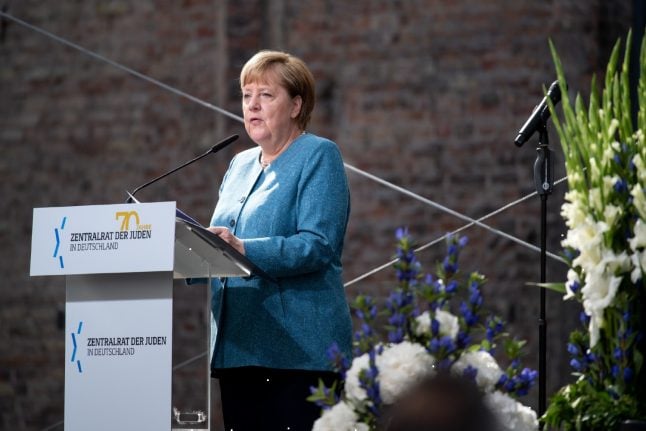“It is true that racism and anti-Semitism never disappeared. But for some time now they have been more visible and uninhibited,” Merkel said during a ceremony to mark the 70th anniversary of the Central Council of Jews in Germany.
German Chancellor Angela Merkel and Council President Josef Schuster both spoke at the ceremony, which was limited to 130 guests due to the coronavirus pandemic.
“It is a disgrace and a source of deep shame for me to see the expressions of racism and anti-Semitism in our country in these times,” Merkel said, calling on German citizens to “never remain silent” over the phenomenon.
Josef Schuster, president of the Central Council of Jews, on Tuesday said the pandemic was acting as a “catalyst” for anti-Semitic hate.
Schuster denounced some protesters for co-opting a symbol of the Holocaust — yellow stars similar to those Jews were forced to wear under the Nazis — to represent their claimed oppression by virus restrictions.
“I know some elderly people who had to wear those stars,” he said. “People
who had to hide for years. People who only just survived.”
In her speech, Chancellor Merkel said that “anti-Semitism is an attack on people, on mankind and on our very existence, but it is above all an attack on the worth of the individual.”
After praising the achievements of the Council, she spoke of the importance of the “willingness and ability to encourage a dialogue” surrounding discrimination.
Merkel also highlighted the “new and comprehensive measures to fight right-wing extremism, racism and anti-Semitism” introduced by the government after the attack in a synagogue in the eastern German city of Halle in October last year.
In 2007, Chancellor Merkel was awarded the Leo-Baeck Prize by the Council for her “sustained and sincere engagement” with the Jewish community.
An unexpected success
The Council was founded in 1950 in Frankfurt am Main to represent the interests of the Jewish community in Germany.
There were only around 15,000 Jews remaining in Germany after the end of the Second World War, the majority of which were survivors of the Holocaust and displaced persons from Eastern Europe.
At the time, the Council was intended to be a temporary measure to aid Jews in Germany in emigrating to other countries.

Capacity at the ceremony was limited due to coronavirus restrictions. Photo: DPA
Few could imagine a future for Jewish life in Germany after the systematic persecution and execution of millions of Jews at the hands of the Nazi regime during the Holocaust.
Nowadays, however, the Council has grown to around 100,000 members and plays a key role in representing the Jewish community on political and societal issues.
READ ALSO: Germany warns of spike in anti-Semitism linked to coronavirus
After the reunification of Germany in 1990, the Council relocated from Bonn to the Leo-Baeck Haus in Berlin, where their headquarters can be found today.
“What started as a provisional arrangement after the Shoah has now become an integral part of German society,” said Council President Schuster.
He stressed that the Council will continue to speak out if the rights of Jewish or other minority communities, as well as basic democratic rights, are endangered.
New challenges
Concerns about growing anti-Semitism in Germany have returned to the spotlight in recent years.
The Council recently warned against the increasing prevalence of conspiracy theories with anti-Semitic undertones at anti-coronavirus protests throughout Germany, along with sightings of right-wing flags and costumes appropriating the victims of the Holocaust.
READ ALSO: Man on trial for Halle synagogue attack that shocked Germany
In July, the trial began of a suspect accused of killing two people in an attack on a synagogue in Halle, Saxony-Anhalt last October.
“We know how quickly words can become actions, as the attack on the synagogue in Halle on Yom Kippur last year alone showed in a particularly terrible way,” Merkel said at the ceremony.
Some six million European Jews were murdered by Adolf Hitler's Nazi regime during World War II.
Germany is now home to the third-largest Jewish population in western Europe, largely due to an influx of around 200,000 Jews following the collapse of the Soviet Union.
The ceremony was streamed live and can be found online here.




 Please whitelist us to continue reading.
Please whitelist us to continue reading.
Member comments